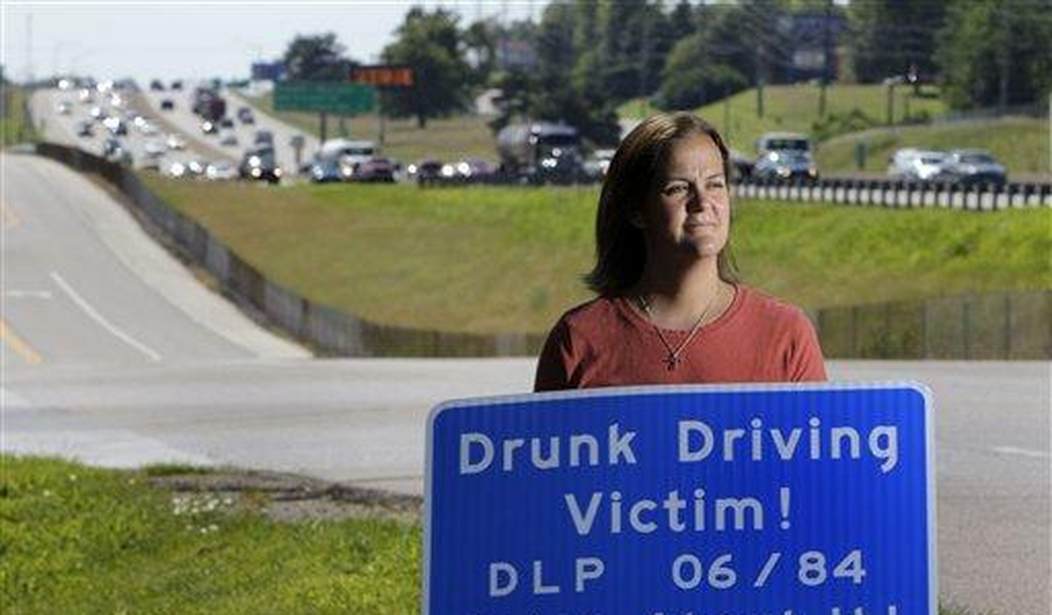Whenever I hear of a new law passing (or on the verge of passing) somewhere, my libertarian reflex activates. Do we really need this? Will it do more good than harm? It’s a rebuttable presumption that whatever the new statute might be, it’s probably unnecessary in a culture that already overpenalizes behavior.
That said, I like this one.
The strongest criticism I can think of is that it’s unlikely to deter anyone. If you’re willing to risk killing someone and doing a long stretch in prison because you insist on driving when you’re wasted, the prospect of also having to pay child support to the victim’s family won’t make you think twice.
But so what? The law aims to do justice. Forcing a reckless killer to make restitution to their victim’s children is just, whatever its deterrent potential.
The Tennessee General Assembly on Wednesday became what is believed to be the first state legislature to pass a bill that would require drunken drivers to pay child support if they kill the parent of a minor…
If signed into law, the measure would require those convicted of such crimes involving the death of a parent to pay child support for the victim’s minor children. It would last until each child reaches 18 years of age and has graduated from high school or until the class of which the child is a member when turning 18 has graduated…
Courts would determine a reasonable amount of child support by considering the financial needs and resources of the child or children, the financial resources of the surviving parent or guardian — including the state if the child is in the custody of the department of children’s services — and the standard of living the children are used to.
The bill is named after three children whose parents were killed by drunk drivers. One was a cop inspecting a manhole when he was run down by a woman under the influence, who then fled the scene.
It’s the first of its kind in the U.S. but it won’t be the last. Missouri, Pennsylvania, and Alabama are looking at similar bills and lawmakers in Texas, Wisconsin, and North Carolina are in touch with the sponsor of the Tennessee bill. The woman who spearheaded the campaign in Tennessee, and who’s now raising her grandson after her son was killed by a drunk driver, says she’s had interest from 17 states. The Tennessee legislation passed the state House 93-0 and the state Senate 32-0. How’s that for bipartisanship in a polarized age?
One question I had as I read about it is what happens to the child support payments if the drunk driver is imprisoned. Are their assets confiscated in order to make the payments in a timely way or are the payments deferred? The answer from the official summary of the bill: “[T]he defendant will have up to one year after release from incarceration to begin payment. If a defendant’s child maintenance payments are set to terminate but the defendant’s obligation is not paid in full, the payments will continue until paid in full.”
That seems less than optimal to me. A child needs financial support most urgently when they’re a child, before they can support themselves. One of the bill’s sponsors framed it that way explicitly, saying that “someone needs to be responsible for the upbringing of those children” when a parent is killed by a drunk driver. The woman who killed the police officer who was inspecting the manhole faces 11 years in prison, raising the possibility that the children of the man she killed won’t see any money for a decade or more. Isn’t there a better way?
What if the state made child support payments immediately on the drunk driver’s behalf and then sought restitution from them after their release? That way the kids get what they need when they need it. And they’re not forced to maintain some direct financial relationship with the person who killed their parent well into adulthood.
Another question I had was what the financial profile might be of the average drunk driver in vehicular homicide cases. I couldn’t find an answer, although a study of DUIs in Finland found that “for working-aged men and women, low income was associated with a higher risk of drunken driving.” If that’s also true in the U.S. then it means a lot of kids aren’t going to get paid (much) under the Tennessee scheme. And if a drunk driver happens to be wealthy, I assume that the children’s guardian will file a civil suit for wrongful death seeking exorbitant damages. If they do and win, the drunk driver wouldn’t owe child support under the Tennessee bill. It’s an either/or thing.
Which makes me wonder if the new bill is mainly aimed at trying to get some money out of lower earners who kill people while intoxicated. That type of person might not have been commonly sued previously since they likely lack the means to pay, which in turn means the victim’s kids would get nothing. A system of automatic obligation under the new bill, in which child support is owed bit by bit over a span of years, will force them to cough something up.









Join the conversation as a VIP Member